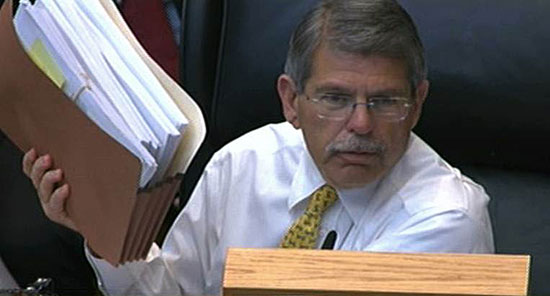DCFS under microscope again
June 26, 2013

Supervisor Yaroslavsky, arguing against a new commission, says now is the time for action, not more recommendations. Here, he displays five years worth of board motions to examine DCFS operations.
Faced with another controversy over the failure of social workers to remove a child from a dangerous home, a divided Los Angeles County Board of Supervisors this week approved the creation of a blue-ribbon panel to investigate the Department of Children and Family Services and recommend reforms—the latest in a series of examinations stretching back decades.
The board’s action, on a 3-2 vote, follows the death last month of 8-year-old Gabriel F. of Palmdale, who was allegedly tortured by his mother and her boyfriend, both of whom are being held on murder charges. Social workers had earlier received multiple reports of abuse and neglect involving Gabriel, only the most recent child fatality to generate headlines and public outrage over the years.
The push for an independent panel came from Supervisors Mark Ridley-Thomas and Michael D. Antonovich and is modeled after the Citizens’ Commission on Jail Violence, which last year recommended dozens of reforms to curb brutality by sheriff’s deputies assigned to the county lockup. Its members, who included former judges, prosecutors and a prominent pastor, were appointed by the Board of Supervisors, who’ll also pick the new panel.
During Tuesday’s meeting, all five supervisors expressed deep frustration over the tragedies that have continued to plague DCFS and have prompted numerous management shakeups and hundreds of recommended reforms from oversight bodies. But the supervisors broke ranks on how best to achieve the foremost goal of keeping youngsters safe, with Ridley-Thomas, Antonovich and Gloria Molina voting for the commission and Zev Yaroslavsky and Don Knabe voting against it.
The proponents argued it was time for a fresh look by a group of independent, highly-respected individuals, who’d be given the authority to examine not only DCFS but other local agencies with which it interacts. The opponents, meanwhile, argued that DCFS’s director, appointed a little more than a year ago, already has made strides—including the adoption of a new strategic plan and training curriculum—and should not be distracted from the job at hand at a critical moment for the department.
Here are condensed excerpts of what each had to say, along with the edited remarks of DCFS Director Philip Browning:
Mark Ridley-Thomas
“Since 2008, there have been over 100 motions on our respective parts. Our collective effort is well documented. But when the time comes to turn our collective will into effective actions, unfortunately we have fallen short. There are times when government is unable to transcend a stagnant set of circumstances. Status quo needs to be altered. And so by establishing a blue-ribbon commission, we can finally get down to why these recommendations have not been implemented and understand what needs to be done. The commission is not intended to re-invent the wheel. Rather, the intent is to get the wheels turning and DCFS and related agencies moving forward. The blue ribbon commission will serve a very distinct role. Some have argued that we already have a children’s commission, so there’s no need for a blue ribbon commission. I would just simply say commissions can and do make governance more dynamic. They are less likely to be politicized and more inclined to be singularly focused, clinical in their pursuit and, therefore, have the opportunity to add significant value… particularly for this population that is so clearly vulnerable.”
Zev Yaroslavsky
“There isn’t a member of this board that doesn’t care deeply about the children who are our responsibility. Nothing makes me more angry than to see a child suffer anywhere, whether it’s in L.A. County, or on my block or in any part of the world. But the question is: how do you get it done? I can almost verbatim tell you what the commission report will say: ‘You’ve got to hire a lot more social workers.’ ‘You’ve got to have more accountability and more transparency.’ All of the kinds of things we have asked our current director to do. And we need at some point to let the current director breathe and do his work under careful scrutiny and accountability by the board. I’m, as many of you know, an adherent of John Wooden, the former UCLA basketball coach, who had a great line, among many great lines, which is: “Don’t mistake activity for achievement.” I think our challenge now is to execute what we know needs to be done. If we had never done this before, if there had never been a study of DCFS before, if there had not been a barrage of state audits before, had there not been a CSIU [investigative unit], then I would say a blue-ribbon commission is the way to go. But it’s ‘activity.’ And whether there’s achievement remains to be seen.”
Gloria Molina
“Very frankly, we’re not finding a solution [to child deaths]. And I wish it were just a problem in L.A. County. When you look at it across-the-board, whether you’re in Chicago, New York, San Francisco, you have the same issues: how to handle it and what we’re doing. There must be something that we’re missing. And so having a set of fresh eyes look at that is a good thing because I know I would be willing to accept a new set of recommendations. I really think that everything in that department has to change and has to change dramatically—everything from training our social workers to hiring our social workers to bringing accountability and, more importantly, to training our managers [who] in most instances can’t manage anything. But I applaud that we are moving forward in this direction. Until the blue ribbon commission concludes its review and analysis and this board acts upon its recommendations, it is the responsibility of this board…to immediately ensure this department continues to provide safety for children under their supervision.”
Don Knabe
“The minute something goes wrong, what do we do? We have another reaction to the media. We have another commission. We have another set of 99½ recommendations. Another rehash of everything we know that’s on the table. I think we’re all tired of hearing recommendations. We already know what needs to be fixed. We all want action and the greatest fear is that our department, DCFS, will come to a screeching halt because we are drowning in recommendations and losing that direction. And this blue ribbon commission would bring it to a total halt…What are they going to tell us that we don’t already know? After all the other recommendations and all of the advice that we have received over the years, what is sorely lacking is the refusal to set aside the many distractions and just get the job done. We must send a message as a board of zero tolerance of any action that exposes our children to harm. Another commission, I don’t think personally, will address those problems or set us on a path in the future. Another commission will just be a distraction to the very, very important work at hand.”
Michael D. Antonovich
“Just for the record, this motion [for a commission] does not inhibit the Department of Children and Family Services from moving forward with the implementation of their strategic plan and some of the most critical components, including the revamping of the training curriculum, policy manual rewrite and staffing reorganization. But what it does do is focus on a very serious issue and brings to a head the problem with recommendations.”
Philip Browning, director DCFS
“In my 40 years of public, private, military service, I’ve never turned down any help and I don’t intend to today. I do believe that there is some value in having a set of fresh eyes look at things. I know I learn something new every day. I do believe also that it’s critical that we have individuals [on the panel] who are knowledgeable, professional, independent, have no conflict of interest in order to really move this department forward. We’ve had some tragedies lately that are just unspeakable. We’re going through a process of investigations and hopefully we’ll get to a conclusion pretty soon. The most important thing I think I’d like to leave you with is that safety, in my opinion, is our primary goal. It’s job one for us. Frankly, most of the situations that don’t end up well don’t occur in foster homes or group homes. They occur when we’re trying to keep children in their families. And that is a very, very tough job. And it is one that they often don’t get thanked for.”
Posted 6/27/13












 405 bridge work causes a stink
405 bridge work causes a stink

